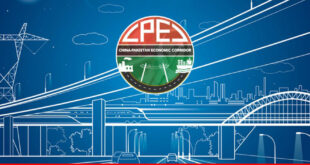Export-oriented industries should be facilitated; resourceful solutions needed to curtail energy challenge
Mr. Ibrahim Qureshi is a President of the All Pakistan Business Forum (APBF), which is a vibrant business association, with representation from numerous industries and business-sectors. It promotes and protects the interests of the business community in Pakistan and also advises the government on; policy formulation, regulatory realignments, economic reforms and implementation, to ensure better quality of life for the common citizens.
Mr. Qureshi did Master of Business Administration (MBA) from United States of America in 1996 while Bachelor of Business Administration (BBA) from United States of America in 1994. In 2001, Mr. Qureshi formed the company Raffles and joined as its CEO. Today Raffles is an Intel Premier Partner in Pakistan, Microsoft Gold Certified Partner. In 2006 we were appointed Distributor for Apple Computers for Pakistan Partner. Mr. Qureshi received a Gold Medal and Business man of the year Trophy in July, 2008.
In a talk, the President of APBF Mr. Ibrahim Qureshi stated that; “Extremism and violent crimes are menaces that have affected Pakistani society, more than any other country. APBF is seriously concerned and committed to overcome the negative impact of extremism on our society.”
Mr. Qureshi has stressed the need for development of skilled human resources as no country can prosper without a sizeable investment in its human resource development.
Commenting on China-Pakistan Economic Corridor (CPEC), Mr. Qureshi said, this vital project would transform lives of over three billion people by interlinking the region with modern infrastructure.
CPEC has transformational impact on regional prosperity as it will be a fusion of multiple developments in the global, regional, bilateral and domestic contexts. The ultimate objective of CPEC is peace, prosperity and well-being of the people of two countries, region and the world.
The APBF President Mr. Ibrahim Qureshi said that infrastructure projects under the aegis of CPEC will span the length and breadth of Pakistan and it augers well; not only for the industrialists of Pakistan but skilled human resource of Pakistan also.
It may be noted that the CPEC is a 3,000-km network of roads, railways and pipelines linking Kashgar in northwest China’s Xinjiang Uygur Autonomous Region and southwest Pakistan’s Gwadar Port. It is a collection of projects currently under construction at a cost of $46 billion intended to rapidly expand and upgrade Pakistani infrastructure as well as deepen and broaden economic links between Pakistan and the People’s Republic of China. It is expected that CPEC will result in the creation of 700,000 direct jobs between 2015-30 and add 2 to 2.5 percentage points to the country’s annual economic growth.
Talking about decline in foreign remittances, Mr. Qureshi suggested the government to announce incentives for oversees Pakistanis so that the drop in foreign remittances could be controlled, besides boosting investment in the country by Pakistani expatriates.
APBF President said that Current Account (C/A) deficit has expanded to US$591 million in July 2016, where US$575 million deterioration was largely owing to US$745 million (or 36% MoM) decline in Workers’ Remittances.
It may be added that remittances sent by overseas Pakistan dropped 20 per cent annually to $1.33 billion in July. The oil-rich Arab countries account for almost 65 percent of entire remittances sent by overseas Pakistani workers.
Mr. Ibrahim Qureshi said that the fall could be a setback for Pakistan as it largely depends on remittances to meet its foreign obligations and reserves.
In July, the inflow of remittances from Saudi Arabia dropped by 20 percent, but it was still the highest at $379 million.
What is more concerning is the plunge in remittances from the United States and the United Kingdom as inflows from these countries fell by 33.5 and 38 percent, respectively. Remittances from US and UK dropped 6 percent and 8 percent, respectively, in the preceding fiscal year.
APBF President said that if government assists overseas Pakistanis and provides them incentives, they can play a pivotal role in boosting Pakistan’s economy through their remittances and investments for the socio-economic prosperity.
He remarked that oversees Pakistanis can invest in agriculture, transportation, telecom and energy sectors which have huge potential. The government has badly failed to attract foreign investment because the persisting process of approval of projects discourages the investors, he added.
Mr. Qureshi further said that export-oriented industries should be facilitated. He was of the view that rules, regulations and procedures for export-oriented sectors should be easy so that it could play its due role in economic stability of the country.”It is a matter of concern that exports are showing a decline trend besides the fact that country has all resources.
He said that we have to focus on investing in the energy sector, lowering of tariffs on smuggling prone items, increasing the share of direct taxes in revenue and lowering the slab of indirect taxes to achieve key economic targets set for the year 2016-17.
Talking about power shortage, Mr. Qureshi said a robust new opportunity has been created for off-grid applications of renewable power technologies, as a large number of Chinese investors, engineers and experts are currently engaged in building large infrastructural projects, under the ‘China-Pakistan Economic Corridor’ (CPEC).
Mr. Ibrahim Qureshi suggested that; “The current power shortfall in Pakistan is around 4500MW to 6000MW and is estimated to cost the economy more than two percent of GDP annually, whereas the power demand is growing at about eight percent per annum. This factor is consistently hampering economic growth. The Pakistani entrepreneurs can seek resourceful solutions from the Chinese experts, to curtail the energy challenge.” Moreover, the Chinese companies can also help the rural and remote communities in installing; independent Solar tube-wells, Bio-Gas Milk-Chiller plants and Wind-Mill farms for domestic lighting and other essential uses to enhance energy-security.
 PAGE Blog Business Weekly Magazine
PAGE Blog Business Weekly Magazine

